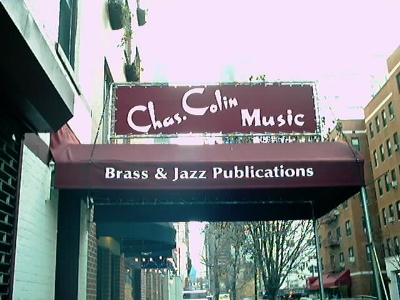@
@
Editor's Note
This book is the reissued edition of Yardbird Originals by Charlie Parker originally published in 1955. Dr. Charles Colinfs memoirs, My Rendezvous with the 40fs Reflections II [New York: Charles Colin Music Publications, 1994] would help us to look into the background of Yardbird Originals book:
In the early 40fs, I had eight studios on the second floor at 111 West 48th Street, with several outstanding teachers. One of them was Jimmy Abato, who played bass clarinet with the Metropolitan Opera Orchestra. Between lessons, Jimmy relaxed by visiting a busy hangout called Jim and Andyfs bar, where the top studio recording and TV musicians gathered to relax for a few congenial moments between sessions.
One day, Jimmy Abato was chatting with Charlie Parker, who confided to Jimmy that he had a rather serious problem with drugs and had decided to seek a cure. He told Jimmy that if he could get some financial help, he would be able to overcome this obstacle to his health. Jimmy asked, gWhat do you need?h Charlie replied, gI need some ready cash.h Jimmy knew that I was into music publishing and said, gWhy donft you let me take you across the street and introduce you to Charles Colin? He might be interested in having you do something for him – possibly write a few BeBop tunes that could be printed in book form.h
At the time, BeBop was neither in full bloom nor understood or accepted by the music world, and certainly not yet by the public. Jimmy escorted Charlie Parker across the street to my studios. We met for the first time and talked about financial possibilities. I told him that I was confident that we could come to some agreement. gJust write some BeBop tunes.h Charlie Parker said, gNo problem, but I need the cash right away so I can check myself into Bellevue hospital.h I said, gIfll be happy to work with you in any way comfortable for you, but we must have a signed contract.h I asked Mildred Williams, my secretary, to prepare a contract. The agreed price was one hundred dollars per tune. Charlie agreed to write five tunes, but he couldnft do them immediately. gI need to get admitted to Bellevue Hospital right away.h I said, gAlright, but we need someone from your immediate family to act as your power of attorney.h gIfll bring my wife Chan tomorrow,h he said. gShe can do that.h I agreed and the next day he did just that. Chan looked over the contract and signed it. Mildred issued a check for five hundred dollars and after Chan endorsed it, I cashed the check for them. I asked Charlie, gWhen will you write the five tunes?h Charlie replied, gJust give me some manuscript paper and Ifll have them for you while Ifm in the hospital.h I said, gOkay,h and that was the deal.
Two days later, Charlie returned and said, gYou know, those patients at Bellevue are crazier than I am! Ifm not going to stay there!h I said, gOkay, Did you do the tunes?h He replied, gNo, but put me in a room and Ifll have them for you in no time.h Charlie went into one of our studio practice rooms and within an hour, he handed me five original tunes! The tunes were what we describe as gheadh tunes – based on standard chord changes like the blues (editorfs note: & Rhythm Changes with Honeysuckle Rose bridges). The tunes werenft too difficult. That was it. That was how the very first Charlie Parker bebop book was created. That was the very beginning of a whole new innovation, a new trend in music. I wasnft worried about investing the five hundred dollars, even though, in those days, that was a considerable amount of money. I felt that the name value of Charlie Parker would be a plus for us because we were getting into gcatalog itemsh Musicians order not only from attractive music titles, but by the names of celebrities who have written books. I felt that it would be a good long-range investment to have such items in our catalog - written by fabulous, recognizable names like Charlie Parker. Our next step was to employ a top arranger (editorfs note: Stan Applebaum) to create an entire book from these five tunes. We figured we could do that by transposing every piece from B-flat instruments to C, E-flat, bass clef and adding a piano accompaniment. That would easily create enough material to bulk-up a good-sized book and to enhance our catalogccc
The five tunes mentioned in the above are: Dum Dum, Half Pass Fass, Throckmorton the Plumber, Tukki Wukki, and Yashitaki Mikimoto. gYashitakih should be correctly spelled as Yoshitaka – itfs a Japanese name. In addition to the five tunes, Bongo Bird, Gerry Bird and Tail Feathers are less known to the public. I do not know how Charlie Parker came up with these compositions; however, I am sure that these compositions and arrangements (corrected and edited in 2005) will be great JAZZ etudes for all instrumentalists who love the breakthrough of American creativity: BeBop!
Masaya Yamaguchi
@
@
